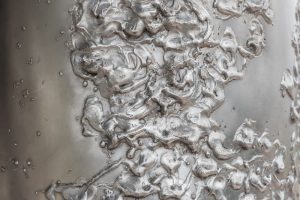Alumina, alumina powder, or aluminium oxide is a compound used in production of aluminum, a metal widely applied throughout industries. However, the scope of its application encompasses a number of other fields including advanced ceramic manufacturing companies. Due to numerous favorable properties of aluminium oxide, it is one of the most prevalent materials across multiple industries. Understanding alumina’s application scope and main properties behind it can benefit your manufacturing process in many ways.
 What are key applications of aluminium oxide?
What are key applications of aluminium oxide?
High pressure resistance, thermal resistance, and excellent hardness, are the main properties of alumina that allow for its wide application scope. This makes various parts and components made from aluminium oxide a welcome addition across a wide range of industries that require precision, complex designs, and favorable physical and chemical characteristics.
Protective and military equipment
Due to its lightweight qualities and exceptional strength, alumina is often usedt in the production of civilian and military protective equipment. Aircraft armor industry is one of the largest consumers of aluminium oxide, while other applications include the manufacturing of vehicle armor, body armor, ballistics for stationary objects and bulletproof windows.
Electronics
Aluminum powder is a crucial component in the production of microchips and other electronic equipment, featuring excellent thermal resistance, as well as a high boiling and melting point. It is also widely used in heat sink insulation. Due to its high conductivity, it’s mainly implemented in creating conductive pathways in electrical devices such as solar cells and light-emitting diodes.
Gem industry
Corundum is the crystalline form of alumina powder and it’s the base element of sapphires, rubies, emeralds, and other precious gems, depending on trace levels of contaminants such as chromium, iron, and titanium. Due to its excellent hardness, it’s used for polishing gems, including the most difficult ones with level 8 hardness.
Construction materials
Alumina is a chemically inert compound with high abrasion resistance, making it an ideal filler for bricks, plastics, and heavy clayware including kilns. It is also used as sandpaper in a wide range of construction-related applications. Aluminium oxide nanofibers are used to design cement-based composites of ultra high strength.
Wide industrial applications
Aluminium oxide can be used in a broad range of industrial applications from hydro cyclones to reducers, valves, nozzles, and piping components such as straight pipes, elbows, and tees. It is suitable for use in the production of cutting tools, machining tools, wear-resistant pump impellers, and thermocouple sheaths.
Catalysis
Alumina can catalyze a range of reactions used industrially. It is most common as a catalyst in refineries, in the Claus process, converting waste gasses of hydrogen sulfide into elemental sulfur, as well as to dehydrate alcohols to alkenes.
Aluminium oxide is also a frequent supporting compound for industrial catalysts, including Ziegler-Natta polymerizations and catalysts applied in hydrodesulfurization.
Why is aluminium oxide used in ceramics?
The inherent properties of Al2O3 can enhance the properties of ceramics. Characteristics such as high melting point and mechanical strength can significantly improve their structural integrity and are one of the reasons why ceramic companies rely on aluminium oxide. Here’s a more comprehensive look at these characteristics:
- Refractoriness and high melting point. The melting point that exceeds 3,600℉ and high refractoriness render the material capable of withstanding extreme temperatures, such as kilns, furnaces, and aerospace applications.
- Hardness and mechanical strength. Particles of alumina can reinforce agents within material, making it resistant to deformation, abrasion, and wear.
- Chemical inertness. This is essential for applications that include contact with aggressive chemicals or corrosive substances.
- Electrical insulation. The insulating properties of alumina reinforced ceramics ensure safety and prevent electrical leakage.
- Thermal insulation. Because of excellent thermal insulation, these ceramics are suitable for applications that require dissipation control and heat retention.
- Dimensional stability. By minimizing thermal expansion, Al2O3 enables the material to retain its shape and structural integrity.
- Biocompatibility. Coupled with high mechanical strength, biocompatibility makes it perfect for medical implants.
- Optical transparency. Transparent ceramics are characterized by high optical clarity, which is valuable in photonics and optics applications.
What are the benefits of oxide ceramics?
Due to the favorable Alumina oxide ceramic properties, but also those of ceramics reinforced with zirconia (ZrO2), these materials have wide applications across industries. However, they also offer numerous practical benefits, including:
- Longevity and durability. They have a long service life and reduce the need for frequent repairs and replacements.
- Cost-effectiveness. While the initial cost can be higher, their durability and low maintenance requirements allow for long-term savings.
- Eco-friendliness. They’re made from abundant natural materials, and their long lifespan can significantly reduce environmental impact.
- Enhanced safety. In fields like healthcare and electronics, they contribute to safer applications because of their biocompatibility and insulating properties.
- Precision manufacturing. The ability to mold oxide ceramics into complex shapes with tight tolerances allows for their use in highly specialized and technical applications.
What are reputable ceramic companies that provide high-quality aluminium-oxide parts?
Wunder Mold has been providing its clients with custom-made plastic and ceramic parts created according to their specific demands for over 24 years. We focus our efforts on specializing in Alumina and Zirconia, becoming one of the very few companies worldwide capable of producing injection-molded advanced technical ceramics of the highest grade. We cater to both international and domestic customers looking to cooperate with a trustworthy advanced ceramic manufacturer.
The machining and molding of technical ceramics is demanding, requiring lengthy experience and extensive knowledge of material properties. This is why we will work with you actively to clearly understand your industry-specific requirements and your needs. Send us an email at sales@wundermold.com or give us a call today.
